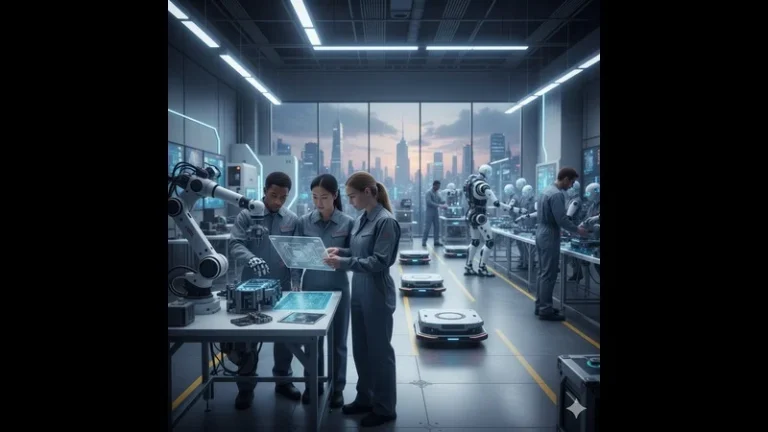
Okay, picture this: you’re in a Manchester warehouse. There’s a robot whizzing past, stacking boxes like it’s auditioning for Britain’s Got Talent, and you’re holding a half-cold cuppa thinking, “Well… that’s new.” Honestly, that’s what work in the UK feels like at the moment. Robotics are turning up everywhere. Quietly. Efficiently. Slightly unnervingly. Humans? We’re just trying to figure out if we should be impressed, scared, or make another cup of tea.
Robotics: From Sci-Fi to Staff Room
Not too long ago, robots meant clunky sci-fi machines. Welding cars, lifting boxes, looking threatening. Fast forward to 2025… and they’re in offices, hospitals, cafés, warehouses… everywhere.
Amazon warehouses are wild. Robots zip about like over-caffeinated bees. They lift parcels, scan boxes, and generally make humans feel sluggish. Humans wander beside them, clipboard in hand, muttering, “Could you just… oh never mind.” Meanwhile, productivity spikes, stress drops, and everyone’s secretly glad the robots exist.
And offices? Don’t even get me started. Robots are quietly sorting emails, nudging calendars, checking reports… leaving humans to argue over whether that BBC iPlayer series is worth a binge or just procrastinate with spreadsheets.
Everyday Robotics (Yes, Really)
Robotics aren’t factory-bound anymore. They’re sneaking into everyday life. Helpful sometimes. A bit ridiculous at other times.
Healthcare
NHS hospitals dabble in robot-assisted surgery. Tiny mechanical arms help surgeons do terrifyingly precise work. Care homes have robot companions that beep to remind residents to take their meds. Kind of like Tamagotchis, but for your nan.
Retail & Cafés
Tesco checkout machines are whirring away while Clubcard points tally magically. Some London cafés have automated baristas serving flat whites faster than you can blink. But the real barista still remembers your weird order and probably makes a sarcastic comment while doing it.
Agriculture
Drones hover over barley in Yorkshire, scanning for pests. Imagine James Herriot meets Terminator. Less bending, less wasted produce, countryside suddenly feels a bit sci-fi.
Postal Services
The Royal Mail quietly embraces automation—partly to prevent mistakes like the Horizon scandal. Machines sort letters and parcels, but they won’t stop someone from moaning about late deliveries.
So, the point? Robots handle the dull stuff, humans handle the creative stuff, the decision-making, the “fun” bits (whatever that is).
Humans Still Matter
Are robots going to steal your job? Nah. They’re brilliant at repetitive tasks, but humans still bring judgment, flexibility, and common sense. Logistics is a good example. Robots lift boxes all day. Someone still needs to check paperwork, fix glitches, and make sure the system doesn’t collapse like a dodgy Jenga tower at your mate’s flat.
Upskilling is key. Learn coding, understand AI, get comfortable with robotics tools. Otherwise, you’ll mutter, “Why isn’t this working?” while the robot ignores you politely. And, if you’ve queued for a Tesco Clubcard deal, you know humans are still needed. Someone must check the points are correct. Robotics help—but they don’t magically fix everything.
Economics & Productivity
Robotics bring efficiency, but they aren’t villains. Bank of England says some roles will fade, others appear—programming, maintenance, oversight.
Jaguar Land Rover is a neat example. Cobots handle repetitive assembly; humans focus on design and quality. The boring bits vanish, productivity rises, and jobs aren’t soul-crushing. Robots make life easier, sometimes even fun.
Workplace Culture: British Style
Britain loves tradition, craftsmanship, and a natter over tea. Robotics? Not everyone is thrilled. “Who’s this metal chap telling me what to do?” mutters someone in Sheffield.
Slow introductions work best. Steel industry eased automation in gradually, paired with training. Trust builds. Productivity stays. Think introducing in-laws to a new partner: a few cuppas, explanations, and eventually… everyone survives.
Collaboration, Not Competition
Humans vs robotics? Nope. Humans with robotics. Robots do the boring, dangerous bits. Humans handle creativity, strategy, tea breaks, complaining about meetings… you get the idea.
Imagine construction workers in Iron Man-style exoskeletons, robotic cranes doing the heavy lifting. Doctors consulting AI for a second opinion before surgery. Humans do the thinking, robots do the grunt work. It’s the dream.
UK Examples
- Ocado: Robots move goods; humans solve problems.
- McLaren F1: Robotic arms assemble car parts; engineers tweak performance.
- Jaguar Land Rover: Cobots assist assembly; humans check quality.
- Royal Mail: Sorting machines prevent Horizon-style mistakes.
Humans are still in charge. Robots just… help.
Preparing for Robotics Future
Upskill constantly: Robotics, coding, AI literacy, data analysis.
- Design workflows for humans + robots: Robots do boring; humans think.
- Follow regulations: UK/EU rules cover safety, accountability.
- Foster adaptability: Curiosity, humour, trial-and-error.
- Plan ahead: Predict evolving roles, see opportunities.
FAQs
Will robots take jobs away from British workers?
No. Repetitive jobs fade; humans still bring creativity, flexibility, judgement.
Which UK industries will see the biggest impact?
Manufacturing, logistics, healthcare, retail, postal services. Think Ocado, Jaguar Land Rover, NHS, Royal Mail.
What skills should UK workers focus on?
Robotics operation, coding, AI literacy, problem-solving, adaptability.
Is it Safe?
Yes. Cobots built for humans.
Salary impacts?
High-skill jobs earn more; repetitive roles may evolve into supervisory.
Small business use?
Totally. Affordable robots, grants, AI tools.
Long-term impact?
Productivity up, errors down, safer workplaces, more time for creative tasks.
Conclusion
Robotics aren’t stealing jobs—they’re making them better. Manchester warehouses, NHS hospitals, London cafés—they’re quietly reshaping work. Embrace them, laugh at quirks, collaborate.
By 2030, UK workplaces = humans + robotics. Humans: judgment, creativity, humour. Robots: stamina, precision, consistency. Together: smarter, safer, maybe fun. Warehouse worker, surgeon, Tesco Clubcard hunter, café barista—there’s room for you. And your robotic colleague. Just don’t expect it to make tea.






